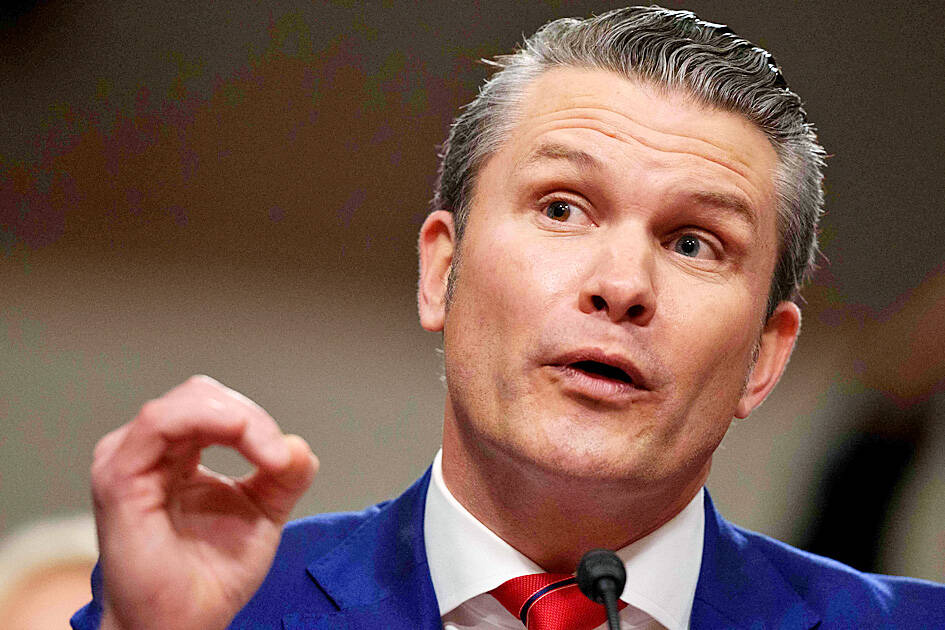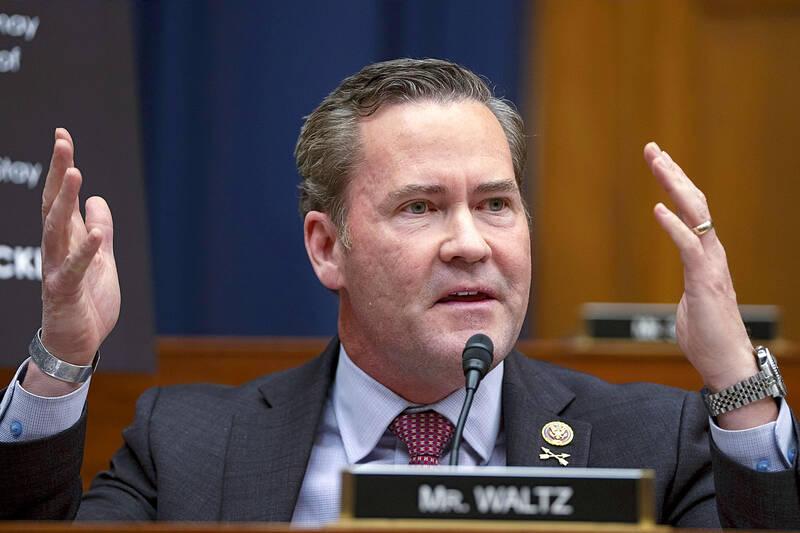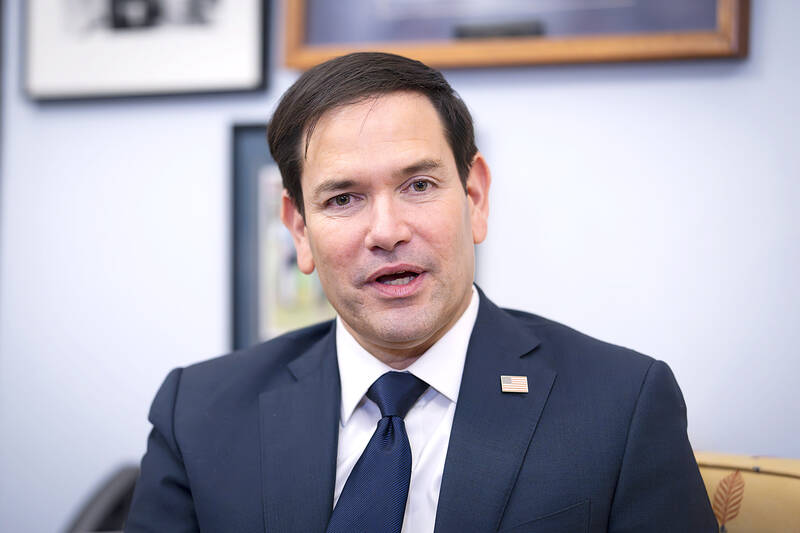US president-elect Donald Trump’s nominee for US secretary of defense, Pete Hegseth, affirmed his commitment to peace in the Taiwan Strait during his confirmation hearing in Washington on Tuesday.
Hegseth called China “the most comprehensive and serious challenge to US national security” and said that he would aim to limit Beijing’s expansion in the Indo-Pacific region, Voice of America reported.
He would also adhere to long-standing policies to prevent miscalculations, Hegseth added.

Photo: AFP
The US Senate Armed Services Committee hearing was the first for a nominee of Trump’s incoming Cabinet, and questions mostly focused on whether he was fit for the position and prior comments made as a Fox News television host.
Hegseth submitted a 75-page report to the committee on Monday last week, which provided a more detailed explanation on his views on China and Taiwan.
In it, he said that “the United States can help prevent miscalculation by maintaining our longstanding policy in support of peace and stability across the Taiwan Strait.”

Photo: AP
Asked if the US should explicitly state its reaction to Chinese use of force against Taiwan, he said that “the United States presently maintains its longstanding commitments as outlined in the Taiwan Relations Act, three communiques and the six assurances. If confirmed, I will review our current posture with the president and other national security leaders, and meet with the committee in a classified session to discuss further.”
Regarding the state of US-China military relations, he said that such dialogue “can be useful in reducing miscalculation and misperception.”
“Intent, however, may not be accurately conveyed by dialogue. Chinese Communist Party actions will always speak louder than their words,” he said.

Photo: AP
Separately, US Representative Mike Waltz, the incoming national security adviser for Trump, on Tuesday said he wants to speed up deliveries of weapons purchased by Taiwan to deter threats from China.
“We have over a US$20 billion backlog of things that they’ve paid for and that we need to work hard to free up and have them get what they paid for as a deterrent,” Waltz said at an event in Washington.
Meanwhile, US Senator Marco Rubio was expected to say China has lied and cheated its way to superpower status at the expense of the US, according to remarks he was to deliver at his confirmation hearing for secretary of state yesterday.
Rubio was expected to call for the US to put its “core national interests above all else once again” as it works to “create a free world out of chaos,” according to the remarks.
“We welcomed the Chinese Communist Party into this global order,” Rubio was expected to say. “And they took advantage of all its benefits, but they ignored all its obligations and responsibilities. Instead, they have lied, cheated, hacked and stolen their way to global superpower status, at our expense.”
The comments amount to a summing up of Rubio’s worldview. He would say voters chose Trump, because they want a strong US that promotes peace abroad and prosperity at home, and that would be the US Department of State’s core mission if he is confirmed.
Rubio, who has long been a member of the US Senate Foreign Relations Committee that is examining his nomination, is expected to face little opposition from Republicans or Democrats in his confirmation process.
Additional reporting from Reuters and Bloomberg

SECURITY: As China is ‘reshaping’ Hong Kong’s population, Taiwan must raise the eligibility threshold for applications from Hong Kongers, Chiu Chui-cheng said When Hong Kong and Macau citizens apply for residency in Taiwan, it would be under a new category that includes a “national security observation period,” Mainland Affairs Council (MAC) Minister Chiu Chui-cheng (邱垂正) said yesterday. President William Lai (賴清德) on March 13 announced 17 strategies to counter China’s aggression toward Taiwan, including incorporating national security considerations into the review process for residency applications from Hong Kong and Macau citizens. The situation in Hong Kong is constantly changing, Chiu said to media yesterday on the sidelines of the Taipei Technology Run hosted by the Taipei Neihu Technology Park Development Association. With

CARROT AND STICK: While unrelenting in its military threats, China attracted nearly 40,000 Taiwanese to over 400 business events last year Nearly 40,000 Taiwanese last year joined industry events in China, such as conferences and trade fairs, supported by the Chinese government, a study showed yesterday, as Beijing ramps up a charm offensive toward Taipei alongside military pressure. China has long taken a carrot-and-stick approach to Taiwan, threatening it with the prospect of military action while reaching out to those it believes are amenable to Beijing’s point of view. Taiwanese security officials are wary of what they see as Beijing’s influence campaigns to sway public opinion after Taipei and Beijing gradually resumed travel links halted by the COVID-19 pandemic, but the scale of

A US Marine Corps regiment equipped with Naval Strike Missiles (NSM) is set to participate in the upcoming Balikatan 25 exercise in the Luzon Strait, marking the system’s first-ever deployment in the Philippines. US and Philippine officials have separately confirmed that the Navy Marine Expeditionary Ship Interdiction System (NMESIS) — the mobile launch platform for the Naval Strike Missile — would take part in the joint exercise. The missiles are being deployed to “a strategic first island chain chokepoint” in the waters between Taiwan proper and the Philippines, US-based Naval News reported. “The Luzon Strait and Bashi Channel represent a critical access

Pope Francis is be laid to rest on Saturday after lying in state for three days in St Peter’s Basilica, where the faithful are expected to flock to pay their respects to history’s first Latin American pontiff. The cardinals met yesterday in the Vatican’s synod hall to chart the next steps before a conclave begins to choose Francis’ successor, as condolences poured in from around the world. According to current norms, the conclave must begin between May 5 and 10. The cardinals set the funeral for Saturday at 10am in St Peter’s Square, to be celebrated by the dean of the College